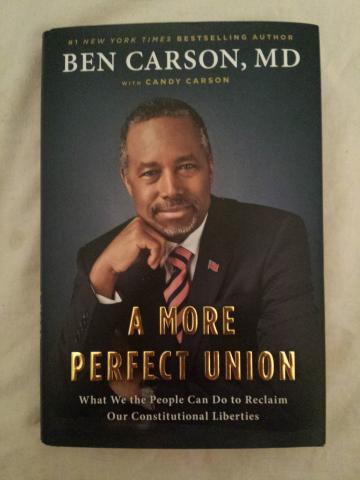Book Review: Ben Carson's "A More Perfect Union: What We The People Can Do To Reclaim Our Constitutional Liberties"
Nov 11,2015
The past month or so hasn't been kind to Ben Carson. Yes, the calm, collected, conjoined twin-separating neurosurgeon has managed to mount the only serious challenge to current GOP front runner and fire breather Donald Trump, but the media have been having a field day with a number (a big number at that) of statements of his that would appear to cast doubt on the good doctor's judgment. From declaring that Muslims are not fit to hold public office to claiming that the pyramids were not built by the pharaohs to commemorate their glory after they passed on but by the biblical Joseph to store grain, Carson and his utterances have been subjected to a level of scrutiny that he is completely unused to and, to be fair, that most people who aren't career politicians wouldn't be able to handle.
Against this backdrop, it is almost a shock that his campaign's obligatory book A More Perfect Union: What We the People Can Do to Reclaim Our Constitutional Liberties doesn't contain any statements nearly as incendiary as the ones he is being grilled for at the moment. Writing in that folksy, commonsensical tone he has become known for, the Republican hopeful still comes across as sensible, even prudent, in the book, making the gap between his spoken remarks and the text all the more baffling. Indeed, the worst thing that could be said about it is that after making a point and reaching his conclusion, Carson quickly drops the subject being discussed and moves onto the next issue even when a little more analysis on his part might have yielded a different conclusion that conflicts with his typically vague, typically conservative prescriptions and assessments. Even so, A More Perfect Union amply provides food for thought and thus hopefully pushes readers to find sufficient answers to the political problems that Carson seeks to solve.
Mirroring the down-to-earth, to-the-point personality of it's author, the book is divided into three clearly-delineated sections, each of which addresses a different aspect of the Constitution. The first is a brief overview of the text itself, it's origins, and it's applicability to today, the second section covers the Preamble and it's implications, and the third analyzes the Bill of Rights and subsequent amendments. If hot-button issues are brought up, they are discussed only within the context of the nation's foundational legal document, and if Carson himself comes up, it is simply to illustrate a point about a particular issue. This fits the book's overarching narrative that Carson isn't planning to dictate policy: he is simply trying to interpret it. While Donald Trump is a rabble-rousing, would-be dictator hellbent on shaking the system up, Carson is an old country interpreter, prescribing solutions only when absolutely necessary and even then within stringent guidelines. Some might be skeptical about Carson's ability to seriously discuss the Constitution given his background in medicine rather than law, but such doubts should be laid to rest when they see him capably explain and analyze it for readers, as Ambassador C. Boyden Gray does in the foreword, writing, "along with his accomplishments in medicine and education, he has a firm grasp of the rule of law underpinning our country," (Carson, x). Of course Carson, being his humble self, would argue that this was no great accomplishment. "Not only is it small enough to fit in a pocket and short enough to be read in one sitting, but the Constitution is also relatively simple and easy to understand. From the beginning, it was designed to be read by the common people - because the founders knew that the Constitution was for everyone, not just the elite," he writes (Carson, pg. 4). This particular quote can be thought of as the first part of Carson's thesis. Not only is the Constitution the basic, underlying law of the land, it is accessible enough for anyone willing to set aside time to read it. This gives citizens a fighting chance when they run afoul of the government: if you know the law, then you know when authorities have exceeded or even broken it.
The second part of Carson's thesis regards what happens when Americans don't take time to familiarize themselves with Constitutional law. "...the biggest threat to maintenance of freedom in America in our time is lack of knowledge," he warns (Carson, pg. 6), and this lack of knowledge, he claims, will create a vacuum in which "elites" will step in and impose their will on the rest of the population. Who are these elites? Carson never explains. He drops hints throughout, alluding to "PC Police" (Carson, pg. 34) who, although not a legally constituted entity as such, have operatives that "exist in government, throughout the media, in educational institutions, etc." (Carson, pg. 34) and censor "the speech and behavior of anyone they consider to be a threat to their leftist ideological domination," (Carson, pg. 35), as well as "special-interest groups" (Carson, pg. 68) that prowl the capital in search of "handouts or preferential treatment in return for campaign contributions or political influence," (Carson, pg. 68) but he never tells us who exactly is responsible for this sinister activity. One can't help but wonder why Carson feels the need to beat around the bush about mysterious "elites" stifling free speech on college campuses and bribing Congress into subsidizing them and their interests when the groups that engage in this behavior do not lurk in the shadows but rather, as anybody who has heard people ranting about "safe spaces" and "bailouts" can tell you, operate in the open, unashamed of their activities. While framing individuals in such groups as members of a secretive cabal might play well with conspiracy theorists, treating them instead as members of an influential, highly-visible ideological tendency, however malignant it may be, would win over an even larger audience to Carson's point of view.
It is this recurring vagueness that keeps the book from being completely solid. When discussing the "provide for the common defense" portion of the Preamble, he says that we must defeat ISIS and other Islamic terrorist groups lest they metastasize into a direct threat to the U.S., declaring, "We must use all necessary resources to protect the lives of our people," (Carson, pg. 58) and that "the earlier the threat can be eliminated, the fewer lives will be lost in the conflict," (Carson, pg. 58). Sounds reasonable enough, but curious readers can't help but wonder what exactly "all necessary resources" entails. Targeted air strikes, like the Obama administration is currently doing? Boots on the ground, like the Obama administration is also starting to do? Or God forbid, dropping the big one, starting in turn a much larger conflict, and turning a good chunk of the planet into glass? These kinds of questions need to be answered, particularly if one of the possible answers is "start World War III". Another example is when he speaks about the Tenth Amendment, which states that "powers not delegated to the United States by the Constitution, not prohibited by it to the States, are reserved to the States respectively, or to the people," (Carson, pg. 168) he praises it for keeping the federal government from forcing it's will on the states and the people that live within them. "If the federal government becomes too dominant, it will try to create uniformity to make domination of the people much easier. This amendment prevents that kind of power grab," he explicates (Carson, pg. 169). Carson's interpretation is both correct and commendable, but also incompatible with one of his policy positions. In a time when even tough-on-crime Republicans and staunch social conservatives are coming round to the view that marijuana prohibition has been a catastrophic failure, Carson says he not only wants to continue the war on drugs but that as president he "would intensify it." Increasing federal drug enforcement efforts would bring the government into direct conflict with states like Colorado that have decriminalized marijuana usage, meaning a Carson administration would have to impose the sort of "unity" he claims to deplore in blatant violation of the Tenth Amendment he claims to adore.
Carson's understanding of the Constitution is not wholly or even mostly flawed however. His interpretation of the Fourth Amendment, with it's promise that Americans will be protected "against unreasonable searches and seizures," (Carson, pg. 162) is unimpeachable, and is even courageously linked to the debate surrounding government surveillance. In a political climate where conservative voters tend to err on the side of security over liberty and rivals like Jeb Bush and Chris Christie sing the praises of the NSA, Carson unabashedly makes his stance known: "There is never a good reason for indiscriminate violation of privacy. If we are to remain free, we must be vigilant about protecting our liberties, not quick to give them up for the sake of security," (Carson, pg. 164). Say what you will about Carson or the NSA, you've got to give him credit for honestly interpreting the Constitution and using it to uphold a position that could very well cost him votes in the Republican primary. Similarly, his section on that most controversial of Constitutional amendments, the Second, interprets it plainly and properly, in marked contrast to what so many are wont to do. Once an advocate for banning semi-automatic weapons, Carson has found himself on the side of gun rights supporters, due in no small part to the defensive role firearms can play. He reasons, "Those who insist that tyranny could never come to America should read about how it to come so many other places that also felt safe. No one ever expects tyranny, but wise men will always be prepared for it," (Carson, pg. 161). You can sneer and dismiss this as an NRA talking point, but before you do, look at Burundi, where tens of thousands have fled their homes in the wake of a government threat to treat them as "enemies of the state" if they do not turn over firearms in a nation-wide disarmament that many are saying could escalate into genocide, and ask yourself, "Am I sure it can't happen here?"
For all his head scratch-inducing ambiguity on hard policy and overly confined analysis of Constitutional and contemporary issues, Carson delivers a satisfying, provocative entry into the realm of political non-fiction. When he overcomes his characteristic cloudiness, he makes his positions known and defends them even in cases when it's not the politically expedient thing to do. As one pours over the text in it's gentle-but-firm tone, one can almost hear Carson reading it in his famously soft, gentle voice, reassuring readers that despite our present social and political ills, everything is going to be alright (though it might help if you vote for him next year, he would probably add). This doesn't even take into account how refreshing it is to read a book by a candidate that doesn't focus on themselves but on the Constitution and how, contrary to popular belief, it is not just relevant, but absolutely vital to tackling the problems of the present. Ben Carson voters will eat it right up, but you don't have to agree with or even like the guy to expose yourself to a unique political perspective. As election season goes on, Trumpets, Clintonites, Sandroids, general political junkies, and yes, even that rarest of creatures - the casual reader - stand to benefit from reading A More Perfect Union: What We the People Can Do to Reclaim Our Constitutional Liberties.






